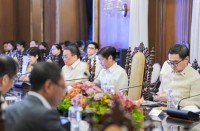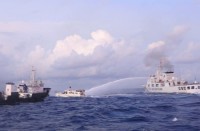MANILA, Nov. 18 — Presidential Adviser on the Peace Process Teresita Quintos Deles rallied hundreds of student delegates who participated in the De la Salle-College of Saint Benilde Model United Nations (Benilde MUN) competition on Saturday, November 15 to be bearers of peace.
“As future diplomats, you must carry the seeds of peace to other nations and enable it to take root and grow. A million others will join you in your noble quest,” she said during the closing address at the culmination of the four-day event.
The event is recognized as the pioneer and largest collegiate Model United Nations competition in the country and participated in by about 600 International Relations undergraduates representing over 30 participating schools from all over the country.
“In bringing the world closer together for peace, foreign policy and strategy are indispensable tools of every nation,” Deles reminded the attendees, expressing her hopes that they responsibly wield their learnings from the previous four days of the conference as future diplomats, negotiators, strategists, and leaders.
Deles recounted the important contributions to and influence of international relations on the Philippine experience of peacebuilding, particularly concerning the celebrated Bangsamoro peace process that the Government of the Philippines (GPH) forged with the Moro Islamic Liberation Front (MILF).
“The world has been a rallying force that has kept both the government and the MILF committed to win the peace at all costs – as we have so won.”
According to Deles, the GPH-MILF peace talks owe much of its success to the invaluable learnings on peacebuilding best practices gained through a “working consensus” with Malaysia, Indonesia and the international community.
Multinational development institutions have likewise committed to provide the rising Bangsamoro with a firm economic backbone for the years ahead, as proven by the notable show of support by the likes of the World Bank, Japan International Cooperation Agency, and the United Nations, among others, during the launch of the Bangsamoro Development Plan earlier this month.
At present, both government and MILF are pushing for the passage of the proposed Bangsamoro Basic Law (BBL) in Congress to formally legalize and operationalize the Comprehensive Agreement on the Bangsamoro (CAB) signed by the parties on March 27 of this year.
The success of this legislation will officially mark the end of decades of armed conflict between the government and the MILF.
Past this point, Deles said that “international partners (shall) remain beside us in this effort of turning the climate of fear into a climate of enterprise,” citing institutions and mechanisms that have and will be created in support of the Bangsamoro normalization process. These include the Independent Decommissioning Body—which includes representative members from Brunei, Turkey, and Norway—and the Transitional Justice and Reconciliation Committee, which is chaired by a Swiss national.
The development of the Bangsamoro region will enable it to “play an integral role in regional trade and cultural exchange in the context of the forthcoming ASEAN integration next year,” Deles also pointed out. She stressed that the increased investor and stakeholder confidence due to the radically improved security conditions will help curb threats of Islamic extremism in the region.
Deles assured the young leaders that given these developments, “real signs of peace” are on the rise in Mindanao.
“If you travel there today you will see more smiles in people’s faces as the burden of fear has slowly given way to the waft of confidence,” Deles said.
“In a sea of conflicts around the world, the Philippines (now) shines as a ‘bright spot for peace,'” Deles concluded.(OPAPP)







